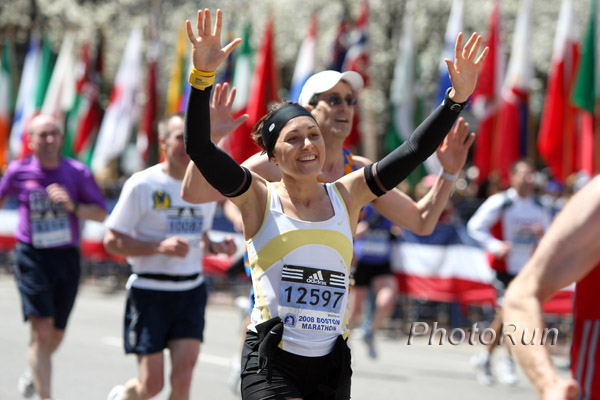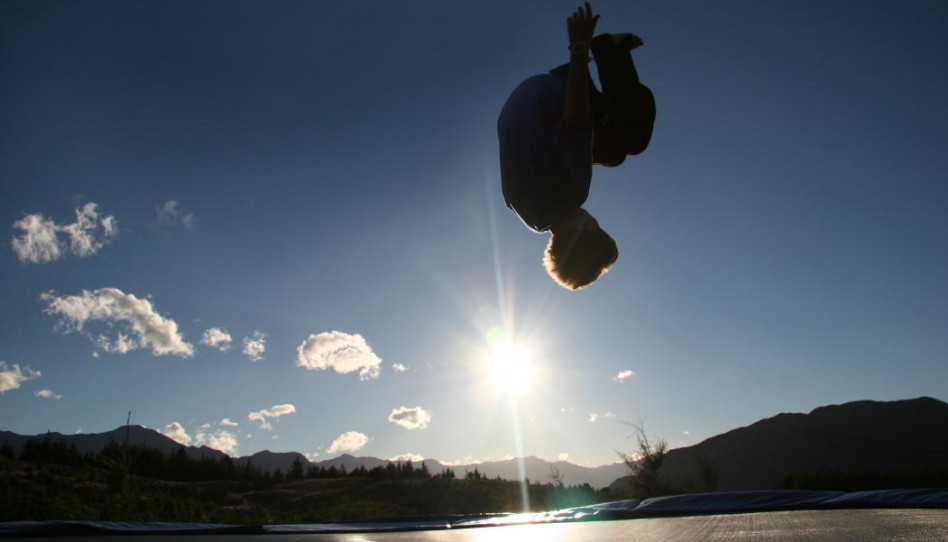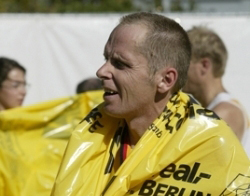Two Days Before the Marathon
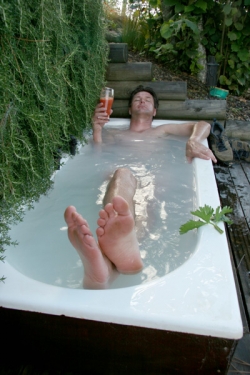
A warm “Hello!” to all of you who are participating in the great sport of marathoning. Congratulations on your efforts so far! Wherever you are going to be running the magical 26.2 miles, I would like to wish you good luck and a wonderful “Day of Celebration.”
Running a marathon can be viewed as a threefold process. First is the commitment to enter the race. Then—after making this sometimes overwhelming decision—you commit yourself to train for the momentous challenge ahead. Finally, you can enjoy the most rewarding and gratifying phase of the marathon—the event itself. With it come endless satisfying memories of the course—and crossing the finish line!
If you are to achieve your personal best, it is important to take extra-special care of yourself in the final two days before your marathon. The most challenging aspects of your training and preparation are behind you—now I hope you relax, enjoy the race, and have some fun. I would like to share with you some short and practical tips that I have grouped below in four categories: training, equipment, nutrition and last-minute tips.
Training
Please avoid the common mistakes to which many marathoners (including the professionals!) fall victim during the days leading up to the race. The most common one is training too much immediately before the marathon. Studies have shown that training in the final days before the race not only will not help your performance, but may actually harm it by leaving you unnecessarily tired or sore.
So take a break in the last two days or just go out and enjoy a short walk. If you feel you need a run to release pre-race anxiety, then jog an easy 2 to 4 miles on the day before the marathon. Of course, our advanced marathoners will have their own unique pre-race routine and may run a little longer. If you do go out for a short run, make sure to jog very gently the entire time to conserve your energy for the big day.
An important tip: Avoid trying anything new before your event. Stay away from new speed workouts, weight training, tree climbing or anything else that is not part of your normal routine. Your goal is to be injury-free and as fresh as possible for your event. Take it easy and save your energy for race day.
At some point during these two days, treat yourself to a massage to loosen tense muscles and relax tight nerves. If it is your first massage, make sure to ask for a light and gentle one.
In summary, everything you do in the final two days before your marathon should be geared toward helping you optimize your mental and physical reserves so you can run the marathon of your life!
Equipment
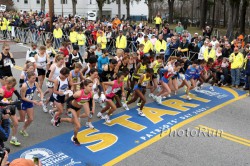
Your most important decision about equipment will be your choice of footwear. Be sure to wear shoes you have used for at least one long run and for some faster sessions so you know they won’t bother you over the course of 26.2 miles. (Unfortunately, I speak from experience. I dropped out of the 1996 Olympic marathon after getting blisters from a new pair of racing flats.) Also, please do not wear shoes that are too old and worn—they won’t have enough cushioning to keep your legs fresh throughout the marathon.
Hopefully, on your previous long runs you experimented with socks of different thicknesses to find what suits you best. I prefer thin socks with no seam, because seams can cause blisters. Some people ask whether they should use jelly or powder between their toes; I don’t recommend either as both can also cause blisters. Additional tips for your feet: make sure your toenails are clipped well. If you need insoles, wear only ones you have used before several times or they, too, may cause blisters.
It is best to wear clothing you have trained in and you know will be comfortable. However, the clothes you wear on race day will depend on the weather. If it is chilly at the start, bring an old windbreaker or another kind of top that you can discard along the way. If it is very cold, you will need a hat and gloves to keep your outer extremities warm. For women, essentials to pack include a bra, a singlet, a T-shirt, a mesh T-shirt, and a long-sleeve shirt. I prefer shorts over tights, especially those with a little pocket for a tissue and some money (in case you want to take a taxi home!). It is a good idea to select clothes made of materials that are light and are able to absorb sweat without becoming heavy on your body. Headbands and wristbands, like those worn by tennis players, alos are helpful in keeping you dry.
Men often apply small bandages over their nipples to prevent chafing. If you have had a bad experience with a rash or inflammation on your upper thighs or upper arms, you may want to apply a zinc oxide cream. Again, make sure to test this treatment beforehand.
Finally, I would like to once again repeat my most important tip: Only wear something you have worn in training or in previous races—something you know will be comfortable!
Nutrition
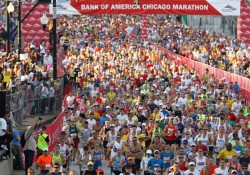
As with training and equipment, your first basic rule is it is best to avoid trying anything new. That is because you might not know how your body will react. For example, if you are not accustomed to spicy food, avoid it in the two days before your marathon since you don’t know how it will affect your digestive system.
It is best to eat nutritious, preferably freshly-prepared food—something you eat on a regular basis. Concentrate on food high in carbohydrates and eat in small amounts throughout the day. The latest scientific research shows this is a better way to carboload (i.e., store glycogen for endurance). The old idea of eating a huge meal the night before doesn’t make much sense. Research shows you can pack your muscles with just as much fuel by consuming small amounts of carbohydrates several times a day. By eating less food on a more frequent basis, you also may reduce bloating and other problems associated with a large meal.
I recommend six small meals throughout the day. If you don’t go out too fast at the start of your marathon, you will burn fat and ensure that your store of glycogen—which is your muscles’ preferred source of fuel for distance running—will last throughout the race.
Pasta is the favorite dish of many endurance athletes (including me). If you follow bike racing and triathlon events, you might know many athletes live on pasta. Sandwiches are fine, too, as well as lentil soup and other healthful foods. I highly recommend muesli and oatmeal, which are both high-carbohydrate foods that are slow to digest and will fill you up while being easy on your stomach. If you usually eat meat, it is fine to have a little during these two days, but remember that what you really need for your upcoming marathon are carbohydrates. Apples are absolutely great for a snack! Another key part of your nutritional program is to start drinking small amounts of water hourly the day before your marathon.
On race morning, the same rule applies—avoid trying anything new. I recommend eating a large bowl of oatmeal with an apple four hours before your race. Then eat something again two hours before the start. If you will be out on the road for four hours or more, some whole-grain toast with nut butter two hours before the race is fine (and by beginning the marathon with a comfortable pace, digestion shouldn’t be a problem). Energy bars also are a good choice and can be eaten one hour before the start. Just make sure that oats are the primary ingredient to get the most long-lasting energy (Odwalla bars are excellent). For more information on race-day nutrition, see the oatmeal and muesli recipes in our article Kick Start Your Day.
Finally, you might be nervous on race morning, so take your time eating and chewing. The more you chew your food, the easier it will be to digest.
These are the same tips I followed before my own races over the years. They are based on both common sense and on the experience of my coach, Dieter Hogen, who has been training athletes for more than 35 years. Ultimately, what is most helpful is to forget about the hype and avoid anything complicated. Just keep things simple in the days leading up to your first—or next—marathon! Because you have prepared and trained so well, I hope you can rest now and get enough sleep, which will help you to have a fresh mind and to stay focused. Give yourself the chance to be mentally and physically at your best on YOUR big day!
Last-Minute Tips
- Check out the marathon course two days before the race. If this is not possible, go over at least some parts of the course. Jogging a section of the course and driving most of it will make you more comfortable with what you will be facing on race day and can help you plan where to run harder or easier. The hills look different when you see them in a non-race situation. For instance, Heartbreak Hill in Boston doesn’t look so bad, and you will realize that it won’t break your heart if you run a smart race.
- Set a realistic goal and put together a race strategy. Especially important is not starting out too fast. You will be super-excited at the start, but try to keep to your planned average pace or even a little slower to save energy for the latter part of the race.
- Maybe you could go to the pre-race expo or to one of the clinics to help you get fired up for your big day. There is always a lot going on during the days before a marathon. Feeding off that excitement can increase your energy level. Just be sure to go easy on the free food samples and don’t let anyone put last-minute doubts about your training in your head!
- Sleep well two days before your race. This will help if you are not able to have a good night’s sleep the night before. Then the rule is to go to bed 12 hours before the start of the race.
- It is best to carry sunscreen and tissues or toilet paper on your way to the start. You never know when you will need them! The sunscreen you may dispose appropriately.
- And, of course, check the weather conditions. But wait for your last-minute evaluation since weather predictions can vary, and often they are not final until a few hours before your event.
- Recruit some friends or family members to be along the course to cheer you on. They will want you to run well, so take in all their energy and transform it into your own.
- Just in case things don’t go well, have a pre-race plan to make sure you get safely home. (I hope this is one tip you will never have to use!)
- Wear your favorite singlet or something you like or are attached to. It could be the “lucky” top or shorts you wore in a previous marathon that will remind you of being successful. Many runners like wearing a top that bears their name, their college’s name, or some other personally meaningful words. You can get little boosts of energy throughout the race from hearing spectators shout the words emblazoned on your shirt or singlet.
- Do not fear anything! Just be super-excited, because YOU are going to do it!
- Have a really good excuse prepared for your friends and family in case you don’t run well and aren’t able to meet your pre-race goal. There are many options here: you could say it was too hot or too cold, the course was too flat or too hilly, you went out too fast or too slow, etc. When all else fails, you could always just say, “But I did what Uta said to do, so it must be all her fault!” (This is another tip I hope you will never have to use!)
Finally, I would like to wish everyone: Good luck and run well—I will be rooting for you! Have lots of fun and a great marathon experience!
Thinking of you and wishing you all the best,

Reading Suggestions:
- Keeping A Cool Focus: Just A Few More Days Until Your Marathon Celebration
- After the Marathon: A Guide to Quick Recovery
Updated March 6, 2016
Updated April 6, 2013
Updated October 2, 2011
Updated April 2009
Posted April 2007
- Posted April 6, 2013
© Copyright 2007-2025 Uta Pippig and Take The Magic Step®. All Rights Reserved.
